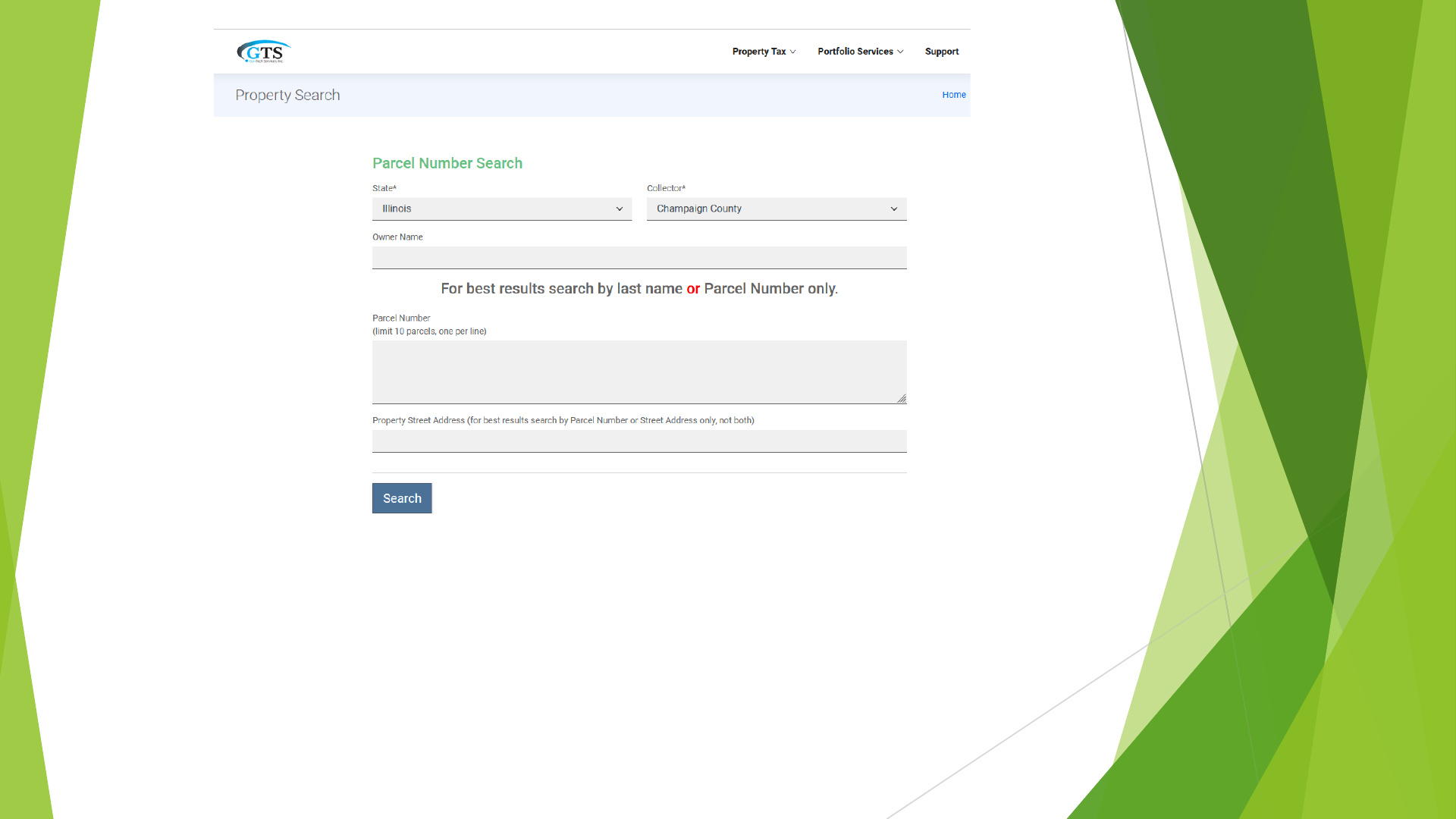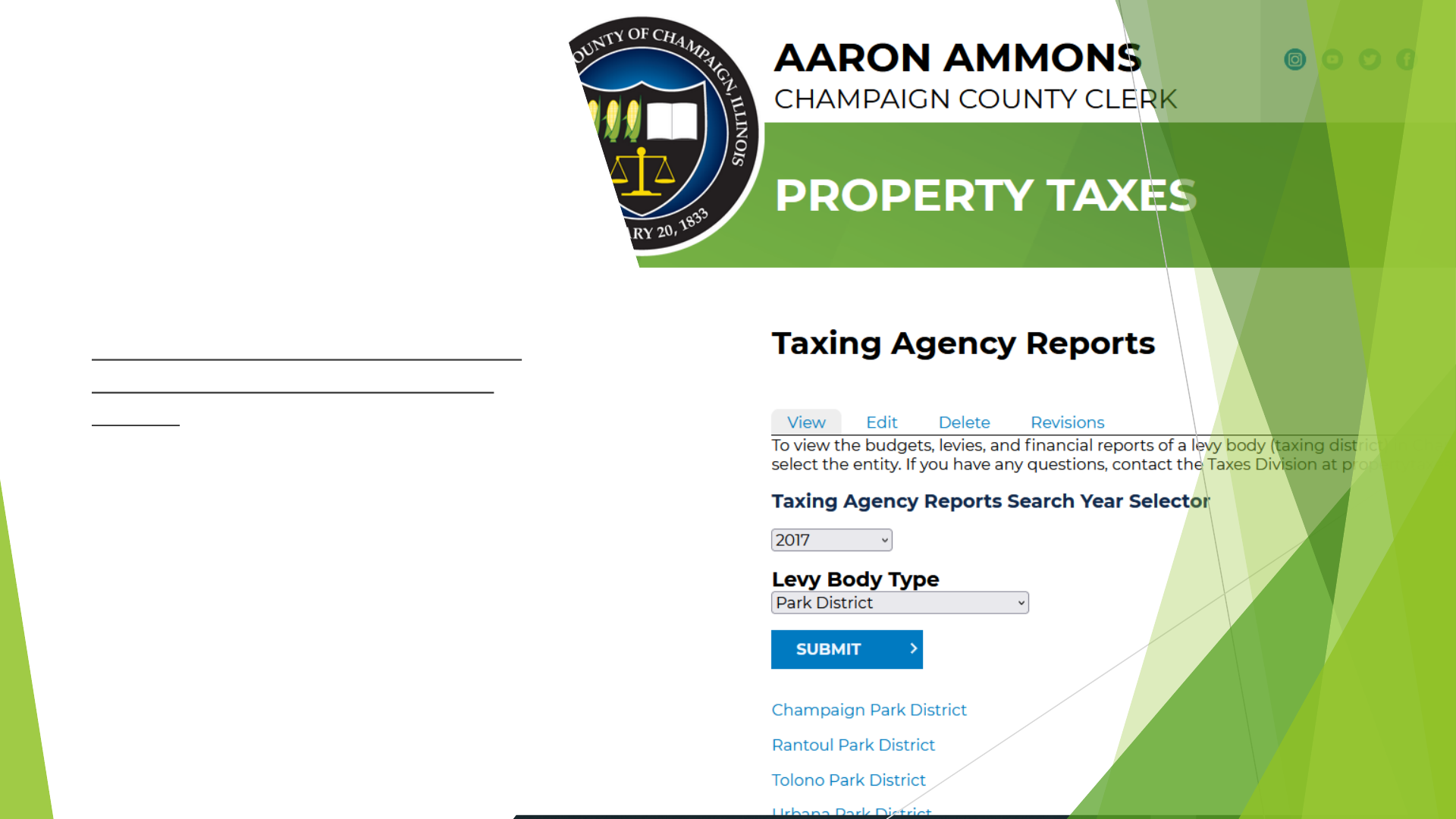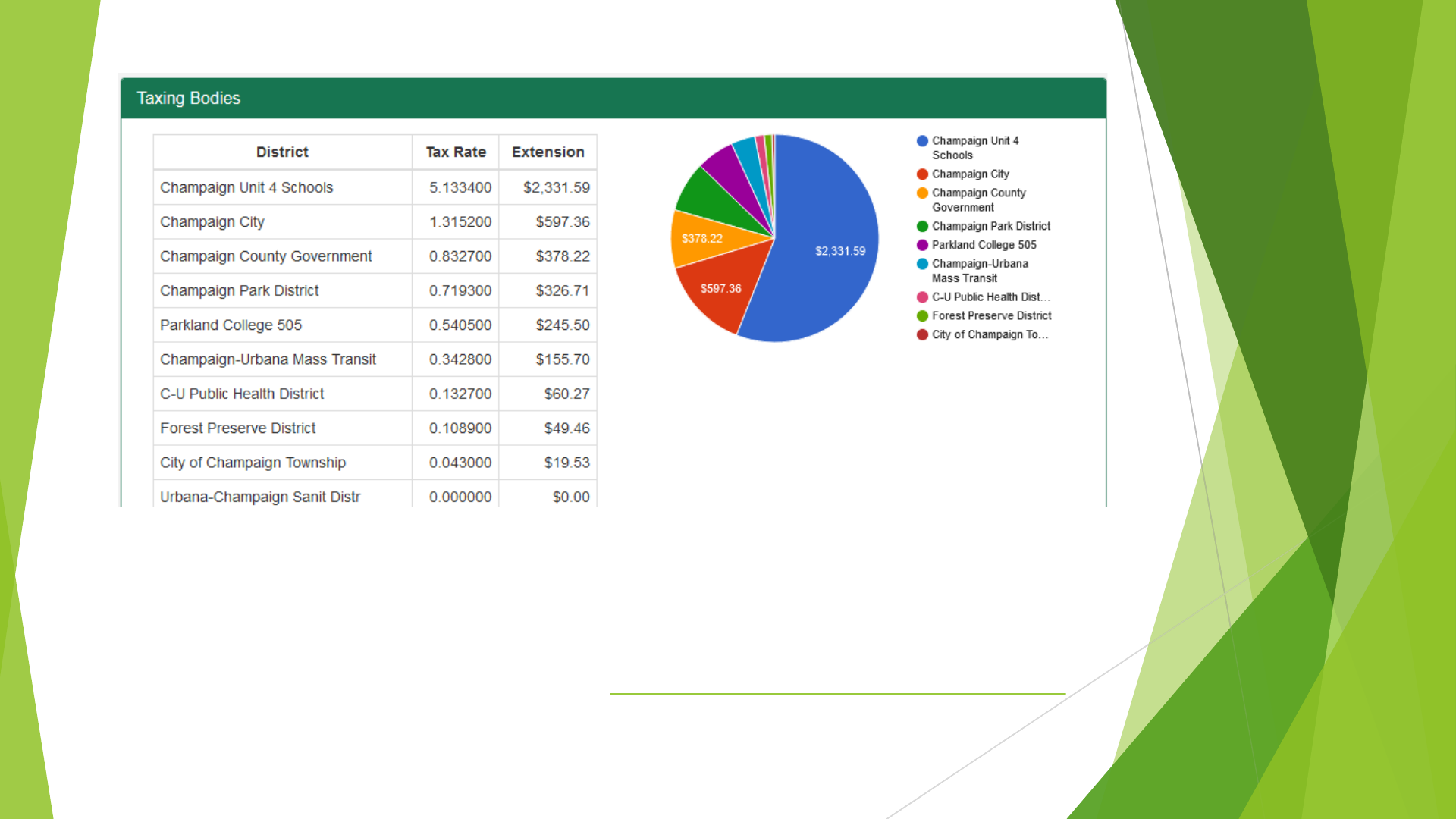
How Champaign County
Property Tax Works
By Champaign County Clerk Aaron Ammons

What are
Property
Taxes?
According to the Illinois Department of Revenue: Property
tax is a tax that is based on a property’s value (ad
valorem). Property is defined as “real property,” land and
any permanent improvements.
Property tax is the largest single tax in Illinois and is a
major source of revenue for local government. Property
tax is the main source of funding for schools, parks,
libraries, fire & police services, and other local
government operations.
Illinois does not have a state property tax. The last year
the State of Illinois had a property tax was 1932. Since
then, property taxes have only been utilized by local
government.

Each Township
Assessor assesses property
values within their Township. With
the exception of farmland & farm
buildings, property is assessed at 1/3
of fair market value. Farmland
Assessments are based on
productivity index provided by the
State of Illinois & soil types. Farm
buildings are assessed at 1/3 of the
contributory value to the farm.
The County Assessment Office
reviews the work of the Township
Assessors and may equalize
assessments as appropriate to ensure
that property is assessed at 1/3 of
fair market value. The Board of
Review hears complaints and
adjusts, as necessary.
After the County Assessment
Office and Board of Review finish
their work an abstract of property
values is submitted to the Illinois
Department of Revenue, who issue
a final multiplier to ensure
property valuations are at 1/3 of
fair market value.
Meanwhile, the Boards of units of local
government are meeting to adopt their
budgets and to determine how much
revenue to request from property taxes,
which is referred to as a "Tax Levy."
Budget and Tax Levy Ordinances are
filed with the County Clerk
The County Clerk calculates property tax rates by
dividing each local government's tax levy by the
equalized assessed value of property within their
boundaries. At this step, tax caps are applied to
limit affected districts to a year-to-year increase
equivalent to the rate of inflation.
The tax rate for your property is the cumulative
property tax rate of all the units local government
in which your property lies.
The County Clerk also adds to certain property tax
bills any Court approved assessments for
maintenance of drainage ditches within the
County.
The County Treasurer and Collector
sends out the property tax bills,
collects property tax revenue, and
distributes it to the units of local
government. The Office also sells any
unpaid taxes at the annual tax sale.
What is the Property Tax Cycle?

How are
Property Tax
Rates
Determined?
Property values are assessed and equalized at 1/3 of fair market
value, and any exemptions or abatements are subtracted to create a
taxing value for each property.
The County Clerk calculates the property tax rate for each unit of
local government by dividing their tax levy by the taxing value of all
of the property within their boundaries. At this step, fund rate limits
are implemented, and tax caps are applied, which limit affected
districts to a year-to-year increase equivalent to the rate of
inflation.
The tax rate for your property is the cumulative property tax rate of
all the units of local government in which your property lies.

Pay Your Property Tax or Mobile Home Bill Online
The link can be found at http://www.co.champaign.il.us/treasurer

What Happens If You Cannot Pay Your
Mobile Home or Property Taxes
If you do not pay your mobile home or property taxes by the delinquency date, the County Treasurer
is required by law to seek court judgement against those owners with delinquent taxes and to sell
those taxes at the Annual Tax Sale.
At the tax sale, investors (tax buyers) will bid their "service" fee for paying the delinquent taxes,
with the lowest bid winning. This fee is a percent of the taxes sold and will be added to the balance
at the tax sale and every six months thereafter. Bids range from a maximum of 18% every six months
to 0%.
Interest begins accruing on the date of the tax sale, in the amount bid by the tax buyer. Every six
months more interest is added. As time progresses, the tax buyer will add costs for notifications,
publications, court filings and service fees. If subsequent years taxes are also unpaid the tax buyer
can pay those once they become delinquent and add them to the original amount, with a 12%
annual interest penalty. The original tax amount, plus any subsequently purchased taxes along with
all interest and fees must be paid at once to "redeem" the property from the tax sale.

What Happens If You Cannot Pay Your
Mobile Home or Property Taxes
The mobile home or property owner or other financially vested party has a period of
time to pay (redeem) the taxes following the tax sale before they could lose ownership.
For residential properties of 1 to 6 units, the minimum redemption period is 2 1/2
years. For all other properties (commercial, vacant, etc.) the minimum redemption
period is 2 years. At the tax buyer's discretion, the redemption date can be extended up
to a maximum of 3 years.
If the taxes are not redeemed by the end of the final redemption period the Court may
order the issuance of a tax deed, which passes title for the mobile home or property to
the tax buyer.
If you think you have delinquent property taxes, check your property at
https://champaignil.devnetwedge.com/ and you can find info on how to pay the
delinquent tax at
https://champaigncountyclerkil.gov/property-taxes/delinquent-
property-tax-search The longer you wait, the more expensive it can get.

Contact Your
Local Tax
Offices
If you have further questions, don’t
hesitate to reach out to your local tax
offices.

Champaign
County Clerk
The Clerk’s Office maintains Tax Sale, Judgement and Forfeiture
records and performs tax rate and tax cap calculations required
for the property tax cycle (tax extension).
The Clerk’s Office is also responsible for accepting
property annexations or detachments and financial documents
from local governments required for tax extension.
The Clerk's Office maintains the register of mobile home
ownership.
Find more info at https://champaigncountyclerkil.gov/property-
taxes

Champaign
County
Treasurer
The Collector sends out approximately 77,000 real estate tax bills annually and
collects funds that are distributed to 125 taxing districts. The bills are usually
mailed in early May and are typically due in June and September each year. The
annual tax sale occurs in late October for properties with unpaid tax bills.
The Collector also sends out 3,400 Mobile Home tax bills. The bills are mailed in
March and are due sixty days after mailing.
The County Treasurer is, by law, the Treasurer and Collector for all drainage
districts, unless they appoint someone else to one or both positions. The County
Treasurer is currently Treasurer for 57 drainage districts in Champaign County.
County Treasurers are more cash managers than long-term investors. Our
investment objectives are Safety, Liquidity, and Yield in that order. These
objectives are spelled out in our Investment Policy, required by Illinois law for
custodians of public funds
Find more information at
https://www.co.champaign.il.us/treasurer/treasurer.php

Champaign
County
Assessor
The Assessment Office plays an important role in your local government. The
office is responsible for over 76,000 parcels. Our mission is to provide the
public with top quality service by helping the public access information and
understand the property assessment process.
The County Assessment Office strives to administer an accurate, fair, uniform,
and timely assessment of all real property in Champaign County in accordance
with, and as mandated by, the Illinois Property Tax Code.
Other duties of the office include name and address changes for property tax
bills, assists taxpayers with all property tax exemptions, equalizes assessments,
performs sales ratio studies, mails assessment changes notices, publishes
assessment changes in newspapers and prepares the tentative and final
abstracts.
Find more information on the Assessor’s website -
https://www.co.champaign.il.us/ccao/assessor.php

Champaign
County Board
of Review
The Board of Review reviews property tax assessments in the County.
The Board of Review accepts and holds hearings on assessment complaints
from July 1 to September 10. After September 10, members research
values on each complaint filed, thereafter issuing a written decision.
Other duties of the Board of Review include the following: intra-County
equalization of property values, representing the County in all State of
Illinois Property Tax Appeal Board proceedings, adding omitted properties
to the assessment records, and acts on exemption requests.
Find more info abut the Board of Review at
https://www.co.champaign.il.us/boardofreview/boardofreview.php


